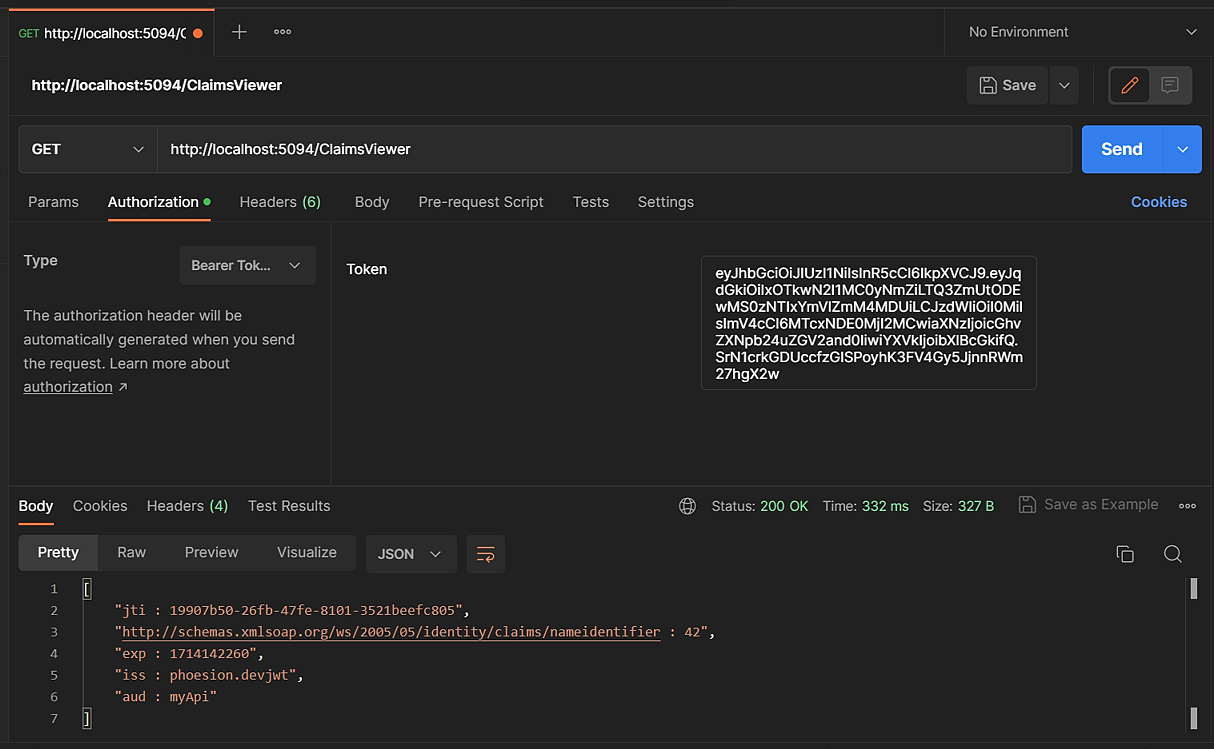Library and dotnet-tool for developing and testing JWT-protected web API services. Create and validate custom tokens that can be used locally, without an external authority.
- Install the dotnet tool
dotnet tool install --global phoesion.devjwt.cli- Generate token using
dotnet devjwt create myApi --email user@mail.com- Configure in
appsetting.Development.json
"Authentication": {
"Schemes": {
"Bearer": {
"ValidAudience": "myApi",
"ValidIssuer": "phoesion.devjwt",
"SigningKeys": [
{
"Issuer": "phoesion.devjwt",
"Value": "c29tZV9kZWZhdWx0X2tleV9mb3JfZGV2c18yNTZiaXQ="
}
]
}
}
}- You can now use the token for your requests.
curl -i -H "Authorization: Bearer {token}" https://localhost:{port}/secret
The repository contains the following samples projects in the Samples folder :
- SampleWebApi : an ASP.Net core web API application (net7.0 and above)
- SampleWebApi_Older : an ASP.Net core web API application (net6.0 and net5.0)
- SampleGlowMicroservice : a Phoesion Glow microservice
- TokenGeneratorSample : a console application that demonstrates how to generate token programmatically
By default, the generator and validator use a predefined key for signing/verifying the token. This way it will pass validation and you don't need to care about where/how the token was generated (doesn't use UserSecrets store), which is fine since it's for local development and testing.
You can however generate/validate tokens using a custom key like so :
- In the tool specify a key to be used for signing the token using the
--signkeyparameter :
dotnet devjwt create myApi --email user@mail.com --sub 42 --signkey thiskeyisverylargetobreak
- Encode the key in base64 format (so you can add it in your
appsettings.Development.json)
dotnet devjwt encode-key thiskeyisverylargetobreak
- Add the key in your
appsettings.Development.json
"Authentication": {
"Schemes": {
"Bearer": {
"ValidAudience": "myApi",
"ValidIssuer": "phoesion.devjwt"
"SigningKeys": [
{
"Issuer": "phoesion.devjwt",
"Value": "dGhpc2tleWlzdmVyeWxhcmdldG9icmVhaw==" // <-- Set your new encoded key here
}
]
}
}
}You can also generate tokens programmatically using the TokenGenerator
dotnet add package Phoesion.DevJwt- Use
TokenGenerator
string userId = new Guid().ToString();
string email = "john.doe@example.com";
string audience = "myApi";
var token = TokenGenerator.Create(audience, email, userId)
.AddScope("openid", "profile")
.AddRole("admin")
.AddClaim("username", "johndoe")
.ExpiresIn(TimeSpan.FromDays(365))
.Build();dotnet add package Phoesion.DevJwt- Enable dev-jwt on your JWT authorization services using the
UseDevJwt()extension
services.AddAuthentication(JwtBearerDefaults.AuthenticationScheme)
.AddJwtBearer(o => o.UseDevJwt(builder.Environment));Notes : it only enables in 'Development' and 'Testing' environments
- Configure in
appsetting.Development.json
"Authentication": {
"Schemes": {
"Bearer": {
"ValidAudience": "myApi",
"ValidIssuer": "phoesion.devjwt"
}
}
}

